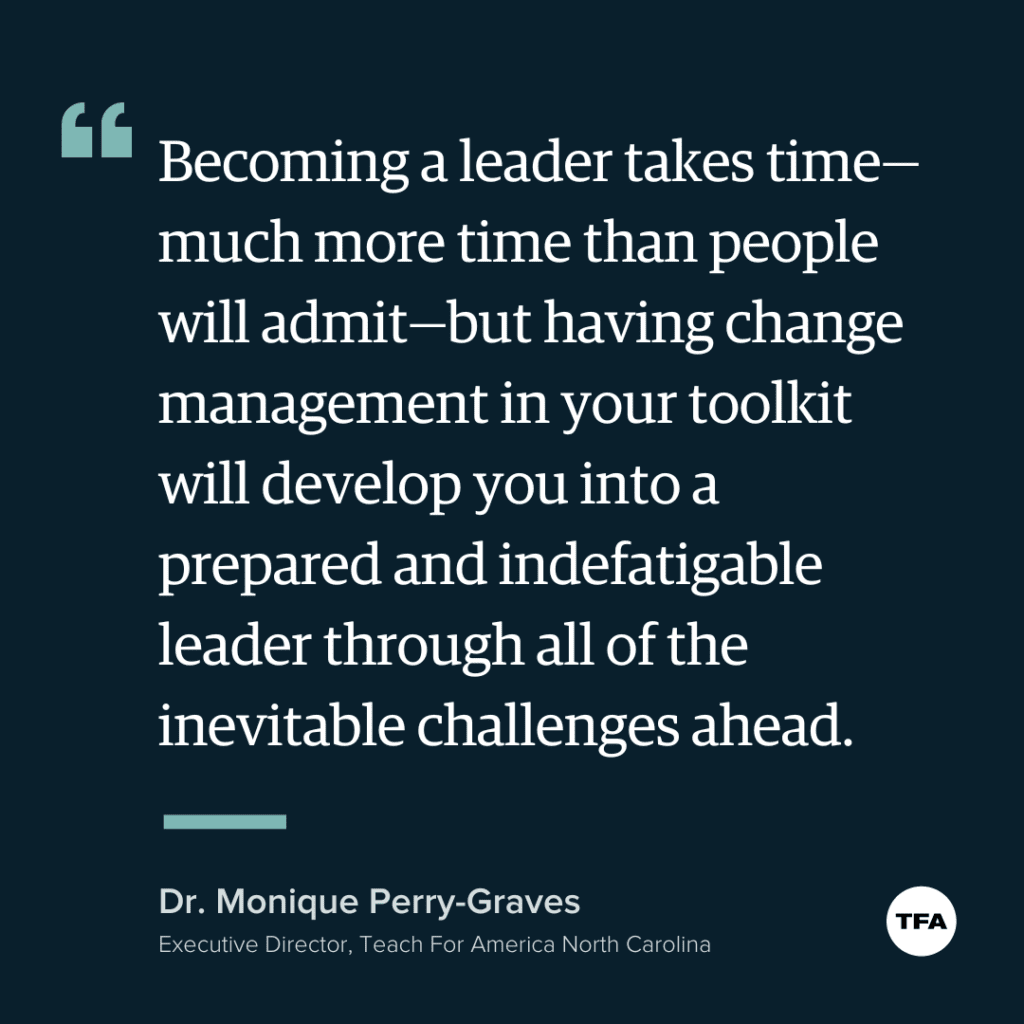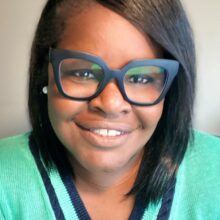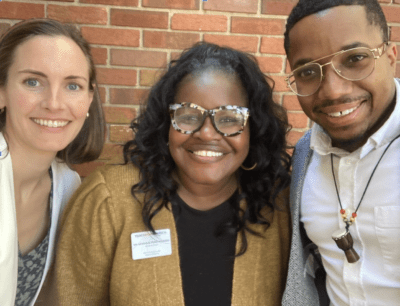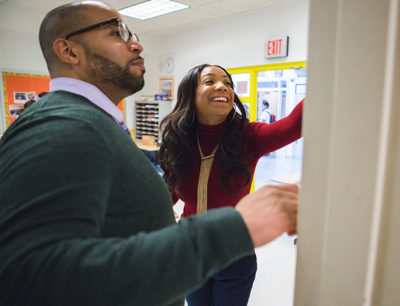

|
|
The following is part of my monthly column, One Day and One Goal: Expanding opportunity in N.C. I invite you to follow along as I share stories from classrooms and explore critical issues facing education in our state. Go here for past columns.
Change is hard, y’all. I’m not here to tell you otherwise.
In the moment, when it gets most difficult, it’s easy to lose focus as to why change is happening in the first place. Holding on to the “why” and the “how” of change, however, is a necessary part of any leader’s toolkit.
When I started this series, it was at the onset of my charge to unify two of Teach For America’s affiliate operations into a statewide model. It was a major change, and though it was called for and supported by our stakeholders it was also a momentous process. What drew me to this role was my desire to make an impact — it’s a calling that centers all of my personal and professional decisions — specifically in the lives of students who deserve an excellent education, regardless of circumstance. I was found to be uniquely qualified for this role and this moment in the organization because of my experience leading large scale change in the business and higher education sectors over more than a decade.
I shared some of these themes, and about how my values and my experience have served as a guide for me, with Dr. Patton McDowell on his podcast Your Path to Nonprofit Leadership. Through our conversation, I was reminded that change is a constant across industries and, while challenging, can ultimately be a positive for organizations and the stakeholders they work alongside. In fact, change presents opportunities: to build trust, foster community, and catalyze impact.
I wanted to offer more about my orientation to change management in a two-part series, answering a question that I am commonly asked: How is it leading such a large scale change?
Listen, and be prepared to hear
When I joined Teach For America, I was making a shift not only in role but in industry. I knew I had to build a path forward for myself and the organization I was leading by deepening my understanding of the context in which we were working.
I set an ambitious goal of having 100 stakeholder conversations, including every member of the North Carolina team and every member of the two Advisory Councils I inherited, in my first 120 days. I went on to speak to school and systems leaders, as well as current teacher corps members and alumni of our program. I spoke to families and students. I spoke to legislators, philanthropists, and peer nonprofit leaders. But I didn’t just speak. I listened.
One thing I did in each conversation was ask for advice. What, from their perspective, should I know? What did their journey look like, and what lessons could they offer me? What were their hopes for public education in North Carolina? What would they do in my shoes?
Not surprisingly, everyone had their two cents to share.
Some answers were immediately relevant and helpful in my role, while others were less so. Still, I was thankful for each and every conversation, because it was time spent building genuine connections rooted in honesty and a shared vision for the future of North Carolina. Since putting this goal into effect, I’ve learned to approach every opportunity—from coaching to data-sharing and fundraising—with an eye toward deepening relationships. It’s what has made every step I took as a leader that much clearer, because announcing a change felt more like a continuation of the conversation.
One of the biggest pieces of advice I wanted to leave podcast listeners with — and what I especially want all of you reading to know — is that listening with intent is essential in leadership. When communication is obstructed, especially during times when change is required, those you lead will inevitably feel dragged behind you rather than empowered to walk alongside you.


Be a relentless learner
My orientation to listening is valuable to me because I’ve seen how effective looking, listening, and learning can be in accelerating my professional development. It is also aligned to the 70/20/10 Learning Model that — to quote the Center for Creative Leadership — asserts that “leadership can be learned,” specifically in a ratio of 70% experience (learning on the job, and taking on stretch roles or assignments), 20% relationships (mentoring, coaching, and peer networking), and 10% coursework (internships, advanced degrees, and professional development programming).
When I was in college and interning through the INROADS program, I said yes to everything. Did I want to sit in on this meeting that had nothing directly to do with my daily responsibilities? Yes. Did I want to shadow a respected expert in a different department from mine? Yes.
I continued this practice as I worked to build my network and skillset outside of my industry. Did I want to join this organization’s local chapter? Yes. Did I want to steer the fundraising committee? Yes.
Part of this attitude was certainly due to my eagerness to exceed expectations as a young Black mother and growing professional. The other part of me, however, recognized every invitation as an opportunity for learning. I may be sitting in on the meeting now, but one day I would be at the head of the table, and I wanted to be ready.
Change management, like leadership, is learned in experience rather than in theory alone. We should accept the wisdom of our educators and mentors, yet continue to focus on sharpening our own instincts and trusting our muscle memory as leaders. On a personal note, my hunger for learning has also made me an insatiable reader. On the podcast, I recommended two books all nonprofit leaders should read, and will continue to share more on my LinkedIn.
There are countless helpful authors and thinkers when it comes to change management. However, I would leave you with one more thought about how valuable learning is to your leadership when you cast your net as wide as possible. Read a book about something outside of your industry. Attend a meeting on a subject you don’t know so much about. These experiences will sharpen your mind and prepare you to learn, adapt, and lead in a variety of circumstances.
Being a leader requires us to have confidence in our experience and the fortitude to continue investing in ourselves with time spent looking, listening, and learning. To be sure, it will take time — much more time than people will admit — but having change management in your arsenal will develop you into a prepared and indefatigable leader through all of the inevitable challenges ahead.
I hope you’ll join me next month for a continuation of my approach to and experience with change management.





